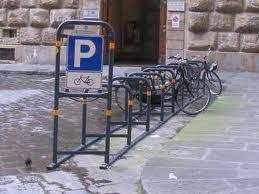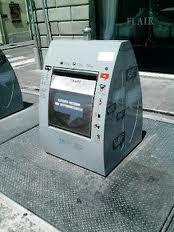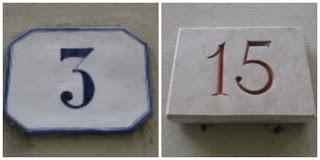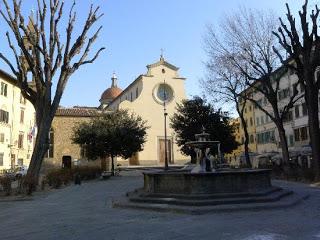 I visited Florence last week. Here are some brief observations that I made. I’ll write more about some of these topics a bit later in the year.
I visited Florence last week. Here are some brief observations that I made. I’ll write more about some of these topics a bit later in the year. Bicycles rule. Although I’ve been to the city many times, I’d never noticed so many foot-powered two-wheelers. My Florentine friend tells me that with increased restrictions on motorized vehicles, bicycles are the way to go.
Bicycles rule. Although I’ve been to the city many times, I’d never noticed so many foot-powered two-wheelers. My Florentine friend tells me that with increased restrictions on motorized vehicles, bicycles are the way to go. There are many places where motorized traffic is limited to taxis, emergency vehicles, and busses. There are lots of bicycle rental stands for tourists, and bicycle parking racks are among the biggest I’ve ever seen.
 Florence is much cleaner than Rome. There’s less litter on the streets—even cigarette butts. And even though Rome—at least in my neighborhood—has daily garbage pickup, there’s always piles of trash lying outside the dumpsters, including the recycling bins. Florence is experimenting with a new collection system called Trashcube. The bins are actually underground. Above ground chutes, that close after use, guide the trash into appropriate receptacles for organic matter, recyclable material, and non-recyclables. And I came across municipal workers hosing down bins after they had been emptied.
Florence is much cleaner than Rome. There’s less litter on the streets—even cigarette butts. And even though Rome—at least in my neighborhood—has daily garbage pickup, there’s always piles of trash lying outside the dumpsters, including the recycling bins. Florence is experimenting with a new collection system called Trashcube. The bins are actually underground. Above ground chutes, that close after use, guide the trash into appropriate receptacles for organic matter, recyclable material, and non-recyclables. And I came across municipal workers hosing down bins after they had been emptied.The weird house numbers. The first time I visited Florence looking for a specific street address, I despaired of finding the place. The numbers read, in order, something like this: 24, 26, 28, 30. Suddenly the next numbers were 127, 129, before reverting back to 32.

I’ve since learned that the original numbering system, dating back for centuries, assigned black numbers to residential buildings and red ones to commercial properties. Over time, some of the distinctions no longer apply because a former residential building may have become commercial and vice versa. The original numbers have been retained. Florentine addresses are given as Via ____ 34n (the “n” for nero, black) or 127r (rosso, red). Today, the black numbers are often blue, and in large properties that have changed purpose or have been subdivided, the colors may no longer ring true.
 I dodged a bullet. One afternoon I sat in the tranquil piazza in front of the home of the late Magdalene Nabb, mystery writer extraordinaire. Friends were chatting on benches; a crazed drunken woman sat on the edge of the fountain, spouting a litany of complaints; children ran around chasing pigeons. Suddenly, I felt a thud against my chest. I thought a pigeon had landed until I saw a young girl kicking around a rather large rock. She’d hit me then went merrily on her way. I’m lucky the rock hit the purse I cradled instead of my face. What an ignominious end that would have been!
I dodged a bullet. One afternoon I sat in the tranquil piazza in front of the home of the late Magdalene Nabb, mystery writer extraordinaire. Friends were chatting on benches; a crazed drunken woman sat on the edge of the fountain, spouting a litany of complaints; children ran around chasing pigeons. Suddenly, I felt a thud against my chest. I thought a pigeon had landed until I saw a young girl kicking around a rather large rock. She’d hit me then went merrily on her way. I’m lucky the rock hit the purse I cradled instead of my face. What an ignominious end that would have been!Language lesson. On my first night, I had a pizza at a pleasant cafe. A little girl sitting at the table to my left kept flirting with me. She didn’t speak—possibly hadn’t yet learned to talk, but she practiced her gestures. She pointed; I pointed back. She waved; I waved back. She clapped; I echoed her. She gestured, ‘come here;’ so did I.
At the table on my right, three college-aged guys kept switching languages. One spoke primarily German, though he appeared to be Japanese. Then he’d speak in perfect English. One appeared to be Italian, but his English was quite good.The third appeared to be American, but he could switch to Italian mid-sentence.
When the waiter brought their bill, they calculated what each owed and asked to pay each part with a different credit card. The poor waiter, who spoke very little English, became somewhat confused by this turn of events. The American student gave the amounts, in English, and the waiter repeated in Italian as he wrote down the amounts. I heard the American say, “Fifty for this one,” and the waiter say, “Quindici per questa.” The waiter had understood 15 for 50, a common error—even for mother-tongue speakers.
I didn’t want to jump in to a conversation that was clearly none of my business, but I learned later that they got it all sorted out at the register. When the waiter brought my bill, I asked him about it and gave him a mini-English lesson: Dov’è l’accento, c’è la cifra. (The digit is where you hear the accent.) FIFty is 50; fifTEEN is 15. He was very pleased and asked I teach English in Florence. Too bad I had to say “No.”
